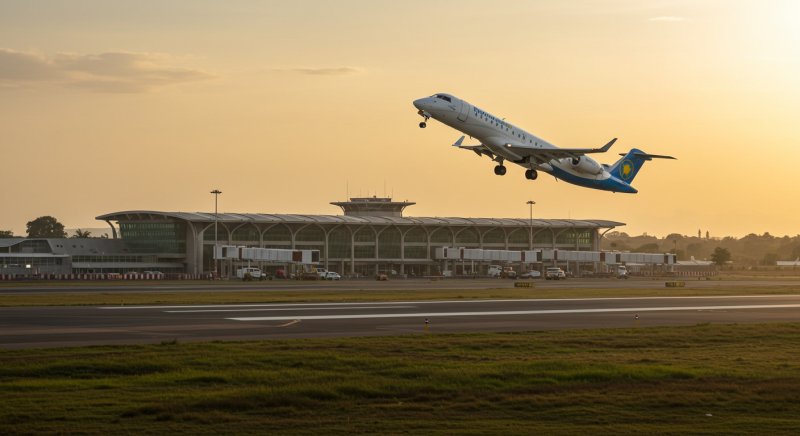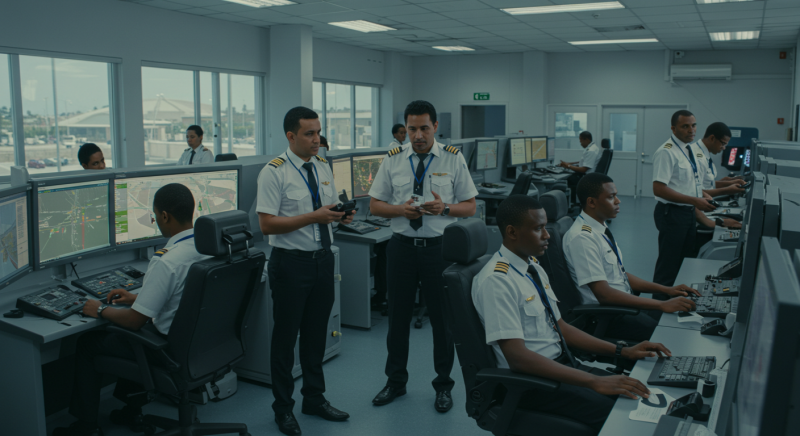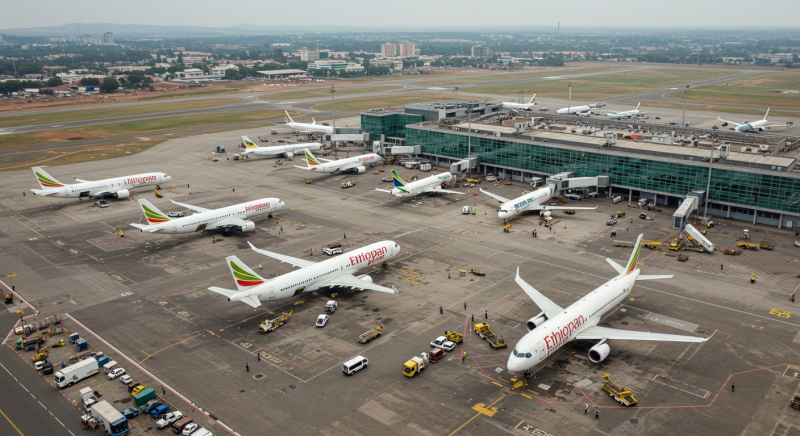The African aviation industry is experiencing unprecedented growth, creating thousands of opportunities for skilled Nigerian pilots and cabin crew members. With airlines across the continent actively recruiting talent, now is the perfect time to explore Jobs in African Aviation and secure your place in this thriving sector.
Key Takeaways
- African airlines are actively recruiting Nigerian aviation professionals with competitive packages
- Ethiopian Airlines offers comprehensive training programs and international career paths
- RwandAir provides excellent opportunities for pilots with modern fleet experience
- The aviation sector in Africa employs over 6.2 million people with growing demand
- Nigerian pilots can earn between $45,000 – $120,000 annually working for African carriers
- Multiple pathways exist for both experienced professionals and fresh graduates

Why Jobs in African Aviation Are Your Gateway to Success
The aviation landscape across Africa is transforming rapidly, with the continent experiencing a 6.5% annual growth in air travel demand according to the International Air Transport Association (IATA). This surge has created an urgent need for qualified pilots, cabin crew, and technical staff, particularly from Nigeria’s well-trained aviation workforce.
Nigeria has twenty (20) airports and many regulated airstrips and heliports; 23 active domestic airlines; 554 licensed pilots; 913 licensed engineers and 1700 cabin personnel. However, this number is insufficient to meet the growing regional demand, making Nigerian aviation professionals highly sought after across Africa.
How to Secure Jobs in African Aviation: Your Step-by-Step Guide
Step 1: Understand the Current Market Demand
The African aviation sector is experiencing robust growth, with 22 jobs to view and apply for now with FlightJobs specifically in West Africa alone. Major airlines are expanding their operations and modernizing their fleets, creating unprecedented opportunities for Nigerian aviation professionals.
Step 2: Target Leading Airlines Recruiting Nigerian Talent
Ethiopian Airlines: Africa’s Aviation Giant
Ethiopian Airlines stands as Africa’s largest and most successful carrier, consistently recruiting Nigerian pilots and crew members. The airline operates a modern fleet of over 130 aircraft and serves more than 125 destinations worldwide.
Current Jobs in African Aviation Opportunities at Ethiopian Airlines:
- First Officer positions for B737, B767, B777, and B787 aircraft
- Captain positions for experienced pilots with African flight experience
- Cabin crew positions with comprehensive training provided
- Technical and ground operations roles
Ethiopian Airlines Group would like to announce a new vacant position in the capacity of Flight Data Officer, indicating active recruitment across multiple departments. The airline’s aviation academy also offers training programs for aspiring pilots, with age limits between 18-35 years.
Ethiopian Airlines provides competitive salaries ranging from $65,000 – $150,000 annually for Nigerian pilots, along with comprehensive benefits including housing allowances, medical insurance, and career advancement opportunities.
RwandAir: The Rising Star of African Aviation
RwandAir has emerged as one of Africa’s fastest-growing airlines, actively seeking experienced Nigerian pilots for their expanding fleet. Rishworth Aviation is partners with RwandAir to offer Pilot jobs opportunities to fly they B737, A330, Dash 8 and CRJ900. Great pay & benefits.
Key Jobs in African Aviation Opportunities at RwandAir:
- Boeing 737 First Officers and Captains
- Airbus A330 pilots for long-haul operations
- Bombardier CRJ900 regional pilots
- Cabin crew and ground operations staff
RwandAir offers Nigerian pilots competitive packages starting from $55,000 annually, with rapid career progression opportunities and exposure to modern aircraft technology.
Arik Air: Nigeria’s Premium Carrier
As one of Nigeria’s leading airlines, Arik Air continues to expand its operations across West Africa, creating numerous opportunities for local aviation professionals. The airline operates a diverse fleet and maintains high operational standards.
Step 3: Prepare Your Aviation Career Documentation
To successfully secure Jobs in African Aviation, ensure you have:
- Valid Pilot Licenses: Current ATPL or CPL with appropriate ratings
- Medical Certificates: Class 1 medical certificate from NCAA or ICAO-recognized authority
- Flight Experience Records: Detailed logbooks showing total hours and aircraft types
- Educational Credentials: Aviation degree or equivalent qualifications
- Language Proficiency: ICAO English Level 4 minimum requirement
- Passport and Visas: Valid travel documents for international assignments
Step 4: Navigate the Application Process
Ethiopian Airlines Application Process
- Visit the official Ethiopian Airlines careers portal
- Complete the online application form
- Submit required documents including CV, licenses, and certificates
- Attend written examinations and simulator assessments
- Complete medical and background checks
- Sign employment contract and begin orientation
RwandAir Recruitment Steps
- Apply through Rishworth Aviation or RwandAir’s official recruitment portal
- Participate in initial screening interviews
- Complete technical and simulator evaluations
- Undergo comprehensive medical examinations
- Finalize employment terms and relocation arrangements
Step 5: Maximize Your Earning Potential in Jobs in African Aviation
Salary ranges for Nigerian aviation professionals working in Africa vary significantly based on experience, aircraft type, and airline:
- First Officers: $45,000 – $80,000 annually
- Captains: $85,000 – $150,000 annually
- Cabin Crew: $25,000 – $45,000 annually
- Technical Staff: $35,000 – $75,000 annually
Additional benefits typically include housing allowances, medical insurance, annual leave tickets, and professional development opportunities.

Essential Requirements for Jobs in African Aviation
For Pilots:
- Minimum 1,500 flight hours for First Officer positions
- 3,000+ hours for Captain positions
- Multi-engine experience preferred
- Jet aircraft experience advantageous
- Clean flight safety record
For Cabin Crew:
- Minimum height requirements (typically 5’2″ for females, 5’6″ for males)
- Excellent English communication skills
- Customer service experience
- Physical fitness and medical clearance
- Professional appearance and demeanor
Training and Development Opportunities
Major African airlines invest heavily in staff development, offering:
- Type rating training for new aircraft
- Recurrent training programs
- Leadership development courses
- International certification programs
- Career advancement pathways
The Ethiopian airlines aviation academy offers a wide range of careers, Discover jobs and Ethiopian employment information online. These training opportunities ensure continuous professional growth while working in Jobs in African Aviation.
Challenges and Solutions in African Aviation Careers
Common Challenges:
- Regulatory Differences: Various African countries have different aviation regulations
- Cultural Adaptation: Adjusting to new work environments and cultures
- Family Relocation: Moving dependents for international assignments
- License Validation: Converting Nigerian licenses for other African countries
Practical Solutions:
- Research target country’s aviation regulations beforehand
- Connect with Nigerian aviation professionals already working in the region
- Negotiate relocation packages that include family support
- Work with aviation consultants familiar with license conversion processes
Future Outlook for Jobs in African Aviation
The African aviation industry is projected to grow by 7.4% annually over the next decade, driven by:
- Increasing intra-African trade
- Growing middle-class population
- Infrastructure development projects
- Tourism sector expansion
- Cargo and logistics growth
This growth trajectory ensures continued demand for Nigerian aviation professionals, making Jobs in African Aviation a secure long-term career choice.
According to industry forecasts, Africa will need approximately 15,000 new pilots and 20,000 cabin crew members by 2035. Nigerian aviation professionals are well-positioned to fill many of these roles due to their English proficiency, technical competence, and cultural adaptability.
Networking and Professional Development
Success in securing Jobs in African Aviation often depends on professional networking:
- Join Aviation Associations: Become a member of pilot and aviation professional organizations
- Attend Industry Events: Participate in aviation conferences and job fairs
- Online Presence: Maintain professional LinkedIn profiles highlighting aviation experience
- Mentorship: Connect with senior Nigerian pilots working in African airlines
- Continuous Learning: Stay updated with industry trends and regulations
Tips for Interview Success
When applying for Jobs in African Aviation, preparation is crucial:
Technical Preparation:
- Review aircraft systems and procedures
- Study airline-specific operational procedures
- Practice simulator scenarios
- Refresh knowledge of aviation regulations
Behavioral Preparation:
- Prepare examples demonstrating leadership and teamwork
- Practice scenario-based questions
- Research the airline’s history and values
- Prepare questions about career development opportunities

Conclusion
The abundance of Jobs in African Aviation presents incredible opportunities for Nigerian pilots and cabin crew seeking international careers with competitive compensation and professional growth. With airlines like Ethiopian Airlines, RwandAir, and Arik Air actively recruiting, qualified professionals can leverage their skills to build successful careers across the continent.
The key to success lies in proper preparation, understanding each airline’s specific requirements, and positioning yourself as a valuable addition to their operations. As Africa’s aviation sector continues its remarkable growth trajectory, Nigerian aviation professionals who act now will be well-positioned to benefit from this expanding market.
Whether you’re an experienced captain looking for new challenges or a fresh graduate seeking your first international opportunity, Jobs in African Aviation offer the perfect platform to advance your career while contributing to the continent’s aviation development.
Frequently Asked Questions (FAQ)
Q: What are the basic requirements for Nigerian pilots to work for Ethiopian Airlines? A: Nigerian pilots need a valid ATPL or CPL, minimum 1,500 flight hours, Class 1 medical certificate, ICAO English Level 4, and must be between 18-35 years old for training programs.
Q: How much can Nigerian pilots earn working for African airlines? A: Salaries range from $45,000-$80,000 for First Officers and $85,000-$150,000 for Captains, plus additional benefits like housing allowances and medical insurance.
Q: Do I need to convert my Nigerian pilot license to work in other African countries? A: Most African airlines accept Nigerian licenses issued by NCAA, but some countries may require validation or conversion. Check specific requirements with your target airline.
Q: How long does the recruitment process typically take for Jobs in African Aviation? A: The process usually takes 2-6 months, depending on the airline and position, including application review, interviews, medical checks, and training.
Q: Are there opportunities for cabin crew from Nigeria in African airlines? A: Yes, airlines like Ethiopian Airlines, RwandAir, and others actively recruit Nigerian cabin crew with competitive packages ranging from $25,000-$45,000 annually.
Q: What aircraft types are most in demand for African aviation jobs? A: Boeing 737, Airbus A320/A330, and regional aircraft like Bombardier CRJ series are in high demand across African airlines.
Q: How can I improve my chances of getting hired by Ethiopian Airlines or RwandAir? A: Gain multi-engine and jet experience, maintain a clean safety record, improve English proficiency, and consider additional type ratings on modern aircraft.
Q: Are there training opportunities provided by African airlines? A: Yes, major airlines like Ethiopian Airlines provide comprehensive training including type ratings, recurrent training, and professional development programs.
Read more Visa-Free Countries for Nigerian Passport Holders: Your Ultimate 2025 Travel Guide
